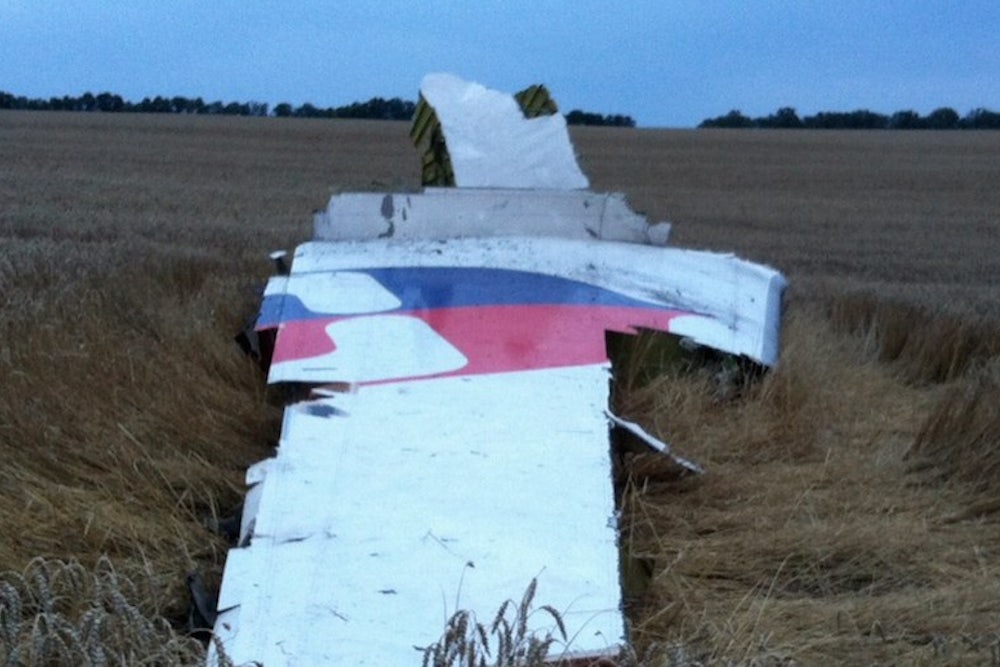Malaysian Airlines just can't catch a break. Just four months after flight 370 disappeared somewhere over the Indian Ocean, Thursday brings news that Malaysian Airlines flight 17, traveling from Amsterdam to Kuala Lumpur, lost contact with ground control around the Ukrainian-Russian border. Initial reports say "50 km away from entering Russian airspace, the plane began descending, then it was observed burning on the ground on Ukrainian territory." The plane, a Boeing 777, is said to have been carrying 283 passengers and 15 crew members.
Over the last couple of months, pro-Russian separatists have been downing Ukrainian military planes with increasing regularity—and mounting casualties on the Ukrainian side. Just earlier Thursday, separatists had shot down another one. All of that seemed to undermine the narrative, propagated by the Kremlin, that the separatists were just a ragtag people's militia who didn't stand a chance against a proper, organized military. The constant downing of Ukrainian jets showed that these men were equipped with some pretty serious stuff: You can't really shoot down a jet with a Kalashnikov.
And, in fact, Russian a state media report from late June indicates the rebels got a hold of a Buk missile system, a Russian/Soviet surface-to-air missile system. Rebels are now denying that they shot down the plane, but there are now screenshots floating around the Russian-language internet from what seems to be the Facebook page of Igor Strelkov, a rebel leader in eastern Ukraine, showing plumes of smoke and bragging about shooting down a Ukrainian military Antonov plane shortly before MH17 fell. "Don't fly in our skies," he reportedly wrote. If that's true, it would seem rebels downed the jetliner, having mistaken it for a Ukrainian military jet.
This has all to be confirmed, though the separatists did issue statements saying they downed an Antonov this morning and took five of its crew members hostage. There is also an off-chance that the Ukrainian military did it, having also declared a no-fly zone in the area recently. The rebels are, of course, busily blaming the Ukrainian military.
Make no mistake: this is a really, really, really big deal. This is the first downing of a civilian jetliner in this conflict and, if it was the rebels who brought it down, all kinds of ugly things follow. For one thing, what seemed to be gelling into a frozen local conflict has now broken into a new phase, one that directly threatens European security. The plane, let's recall, was flying from Amsterdam.
For another, U.S. officials have long been saying that there's only one place that rebels can get this kind of heavy, sophisticated weaponry: Russia. This is why a fresh round of sanctions was announced yesterday. Now, the U.S. and a long-reluctant Europe may be forced to do more and implement less surgical and more painful sanctions.
This also seems to prove that Russia has lost control of the rebels, who have been complaining for some time of being abandoned by President Vladimir Putin. There is no way that, a day after criticizing the recklessness of American foreign policy, his military shoots down a passenger plane. Rather, it seems that the rebels made a mistake that paints Putin into a corner. Putin hates corners, and when he's backed into one, he tends to lash out. He especially hates to do or say what is expected of him, and to give in to outside pressure. So though he has already expressed his condolences to the Malaysian government, don't expect him to do anything swift or decisive. He will likely do something to punish the rebels after the spotlight moves on to the next global crisis.
My first reaction to this was that this is a game-changer, and it's a game-changer in that it drags in the outside world, but it's hard to see what the consequences of this could be. Even if and when the evidence is marshalled to point to the rebels, what can the West do to punish them? What can it do to punish Russia for giving them these capabilities? What can it do to end the conflict? More sanctions? Putin's been blowing them off and they haven't altered his calculus all that much. A peacekeeping mission? There is still no appetite for boots on the ground and Russia still has that U.N. veto. Even if the U.S. gives Ukraine lethal military aid, it in no way guarantees that Kiev's military will be able to crush the separatists, especially not without some bloody, horrific urban warfare. The plane went down, raised the stakes, but what can the West—or Moscow—really do about it?
The one thing we know now is that this conflict is now officially out of control. As we've been saying at The New Republic all along, Putin has started something he can't finish, unleashing a dangerous force he no longer fully controls—nor does he seem to care to—and it's costing more and more lives. Now that tally happens to include 295 civilians who had absolutely nothing to do with either Russia or Ukraine.
Correction: This article originally refererred to Malaysia Airlines flight 370 as flight 380. The post has also been updated.
